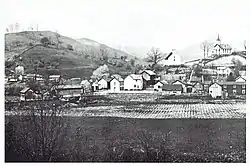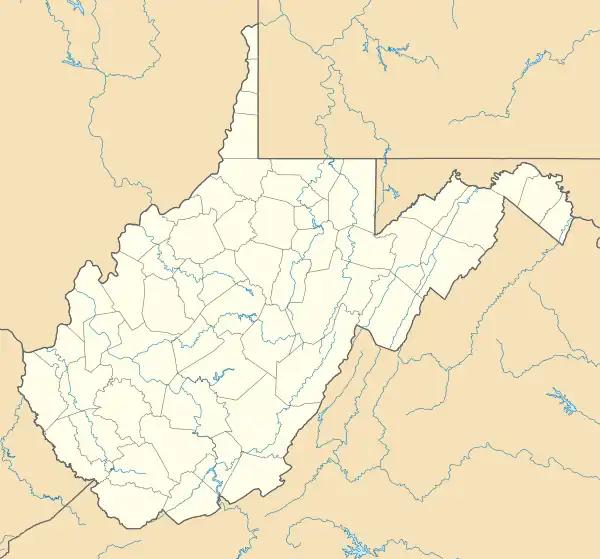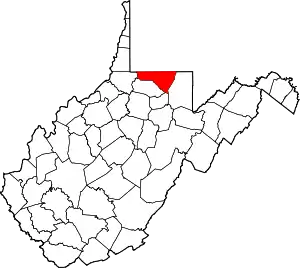Wadestown, West Virginia
Wadestown — formerly West Warren — is an unincorporated community in Monongalia County, West Virginia, United States. It is located on West Virginia Route 7, approximately 7.5 miles (12.1 km) west-southwest of Blacksville.
Wadestown, West Virginia | |
|---|---|
 Wadestown circa 1900 | |
 Wadestown, West Virginia  Wadestown, West Virginia | |
| Coordinates: 39°40′31″N 80°20′17″W | |
| Country | |
| State | |
| County | |
| Elevation | 312 m (1,024 ft) |
| Time zone | UTC-5 (Eastern (EST)) |
| • Summer (DST) | UTC-4 (EDT) |
| Area code(s) | 304 & 681 |
| GNIS feature ID | 1548701[1] |
.jpg.webp)
Geography
Wadestown is situated in a bottomland where four streams converge: Range Run, the West Virginia Branch of Dunkard Creek, and the North and South Forks of the second named stream. In fact, the North and South Forks converge about 1000 feet before joining the WVBDC, and the downstream stretch is not normally given a separate name on maps. At one time, there were two covered bridges in Wadestown; one spanning the North Fork and one spanning the unnamed stretch. A sharp ridge juts into Wadestown from the north and two prominent buildings — the West Warren Baptist Church (organized 1854) and the Wadestown Methodist Church (organized 1842, built 1854) — once looked down upon the village from there. Both churches have since relocated and the heights are now occupied by the large Wadestown Cemetery with its more than 1,100 interments.
History
Wadestown was first called West Warren. It became Wadestown sometime after 1825 when Thomas B. Wade (1787-1869) — a locally prominent physician, farmer, and landowner — bought 232 acres of land from his brother Elisha Wade (1795-1843) on the Left Fork of Dunkard Creek for 100 dollars. He sold many of the lots (at least 12) from this land. The Bank of Wadestown and the store building where Morris J. Garrison kept store for many years are both located on lots originally laid out by Thomas Wade.[2] Wade later moved on to Indiana, then Iowa, where he died.[3]
See also
References
- U.S. Geological Survey Geographic Names Information System: Wadestown, West Virginia
- From: The Wade Family, Monongalia County, Virginia, now West Virginia (1927) by Franklin Marion Brand (Morgantown, West Virginia; 486 pgs.: ill., coat of arms, facsim., map, ports.): "He [Thomas Wade] became a large land owner in Monongalia County, Virginia. On January 1, 1825, he purchased of Elisha Wade 232 acres of land on the left hand fork of Dunkard Creek for one hundred dollars. The deed for this land was acknowledged by Elisha Wade and Ann Wade, his wife, before John Smith and Samuel Jack, two justices of the peace in Switzerland County, Indiana…. In fact, Thomas Wade was probably the founder of the place, as he sold many of the lots, at least twelve, from the land he owned there.... The Bank of Wadestown and the store building where Morris J. Garrison kept store for so many years are both located on lots originally laid out by Thomas Wade…."
- From Brand, Op. cit.: "His place of residence while he remained in [West] Virginia cannot be definitely fixed for all of the time he lived here. (...Wiley's History of Monongalia County states that his son Alexander was born on Scott's Run. His sons, George Irvin and Govey, were born in Indiana. When he went there or where he lived in that state cannot be stated...). Neither do we know when he returned to [West] Virginia. … He undoubtedly lived at West Warren for many years, for three of his sons married daughters of men who lived in that region, Alexander, Waitman, and George…. After 1844 he lived on Paw Paw Creek in Marion County….He probably went to Iowa in the spring of 1853… Thomas Wade was a physician as well as a farmer. He was always regarded as a leading man in his community. About the 22nd day of April, 1869, having just returned from visiting his relatives in Indiana and his sons in Appanoose County, [Iowa,] he came to the home of his grandson, Alfred Conner, and was not feeling well. He passed away on the 27th day of April, 1869, and lies buried in the Cemetery at Chariton."
